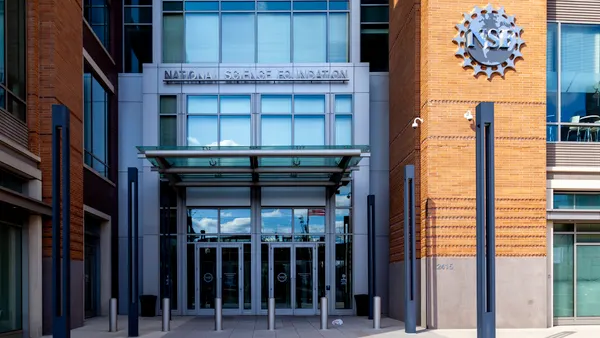Dive Brief:
- The Education Department has deemed the Accrediting Council for Independent Colleges and Schools (ACICS) in compliance with 19 of 21 required standards for federal recognition, according to a letter to ACICS from Diane Auer Jones, the department's principal deputy undersecretary.
- ACICS will be given 12 months to comply with the remaining two criteria. The decision requires the support of Education Secretary Betsy DeVos, which she is expected to give, according to The Chronicle of Higher Education. Auer Jones said ACICS was "likely in compliance" with several criteria in 2016, though a separate report earlier this year found ACICS had failed to meet nearly 60 federal regulations concerning accreditation.
- The letter is a draft of a document prepared for a hearing to permanently restore ACICS' federal accreditation after DeVos temporary reinstated it earlier this year for the duration of a review of additional documents that the Trump administration said the previous administration overlooked when rescinding ACICS' recognition in 2016
Dive Insight:
The draft letter's release comes one month after DeVos announced the second delay of the department's highly anticipated decision on ACICS' fate. It is expected to put ACICS back on track to permanent federal recognition, which is required in order for it to offer Title IV funds.
ACICS was the accreditor for two for-profit institutions — Corinthian Colleges and ITT — whose high-profile collapses in 2015 and 2016, respectively, reverberated throughout the higher education industry and triggered a crackdown on for-profit operations by the Obama administration.
Most institutions ACICS oversaw have since found new accreditors, Inside Higher Ed reported. Should ACICS retain its permanent federal recognition, that attrition means it will need to draw new institutions in order to remain viable. Given its current status, that could prove challenging.
The nature of postsecondary education is changing and expanding to incorporate new learning modules. As such, some industry observers say the standards used to determine whether an institution is accredited should also adapt. That could include establishing a consistent set of standards applied by the wide range of accreditors — from regional and national to programmatic and faith-based — as well as gathering and offering transparency around information detailing where institutions are succeeding and where they are falling short.













